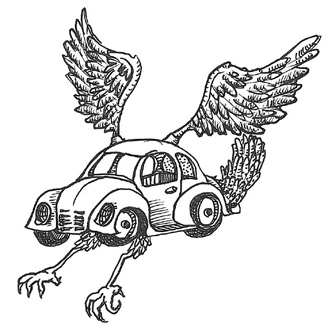
Related Questions
- Is it possible to collect energy from a moving roller coaster?
- What’s the difference between fuel efficiency and fuel economy?
- Can we use heat generated from an air conditioner or refrigerator?
- Is it possible to collect energy from foot traffic?
- Is it possible to construct a perpetual motion machine?
- Can we calculate the efficiency of a natural photosynthesis process?
- How do birds sit on high-voltage power lines without getting electrocuted?
- Why do the products of a nuclear fission reaction in uranium have three neutrons but not three protons?
- What’s the difference between AC and DC?
- Could we use exercise machines as energy sources?
Which engine is better at high altitude: diesel or gasoline?
The answer is in the air
By Meg MurphyThis question is the source of heated debate among car aficionados everywhere.
For a clear answer, we went to Wai Cheng, a professor of mechanical engineering and director of the Sloan Automotive Lab (where he does research on engine performance and emissions, combustion science, and energy conversion).
“Let’s go a little bit slower and start with a broader question,” Cheng says. “Why do all engines suffer at high altitudes?” The answer is that the air is thinner, meaning it is less dense and there are fewer oxygen molecules to fire the combustion process. “An engine sucks in air. The amount of fuel it can burn is limited by how much air it can suck in. When the air is less dense, the amount of air in the engine cylinder is less — so the power output is less,” he says.
For gasoline engines, you have to open up the throttle wider to achieve the same output at a high altitude. Opening the throttle wider adds more air. The less restrictive throttle lowers the work required to move the air into the cylinder —commonly called “throttle loss.”
Efficiency improves. “For a gasoline engine, the throttle loss is less, which means better fuel efficiency,” Cheng says. But the gasoline engine is not our winner.
Here’s why: a diesel engine is not throttled in the first place. Its efficiency at part load does not significantly change with altitude. Meanwhile, the improvement we see in the gasoline engine’s efficiency is just not big enough to overcome the standard efficiency gap between it and a diesel engine. “Thus, the diesel engine is still more efficient than the gasoline one at high altitude,” says Cheng.
So the next time you’re headed to the mountains, leave the gasoline-powered car at home and save a few pennies on fuel.
Thanks to Vishal Thakur, 23, from Hamirpur, India, for this question.